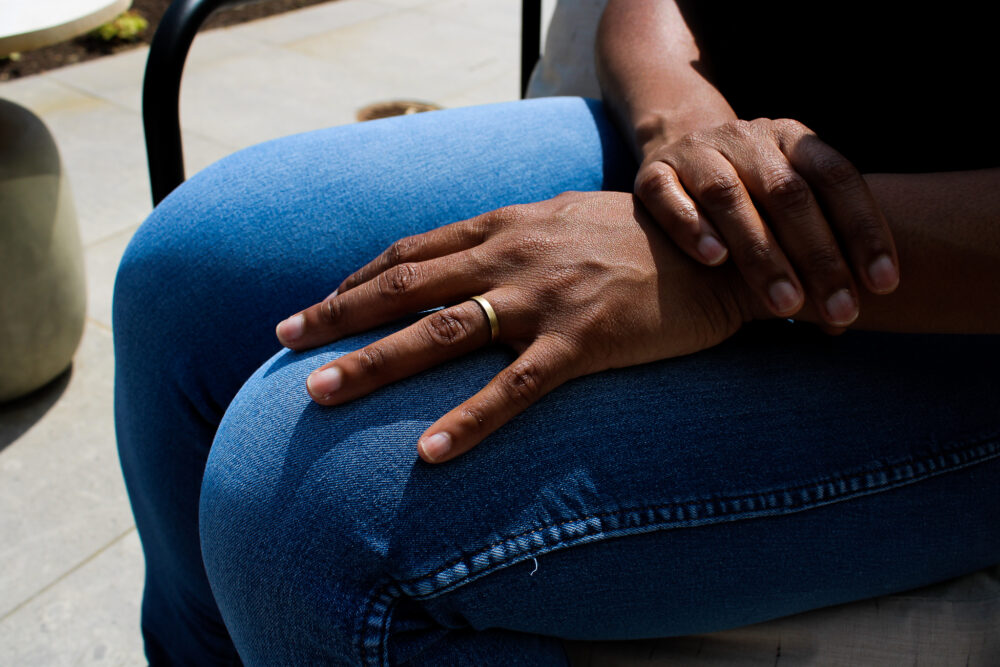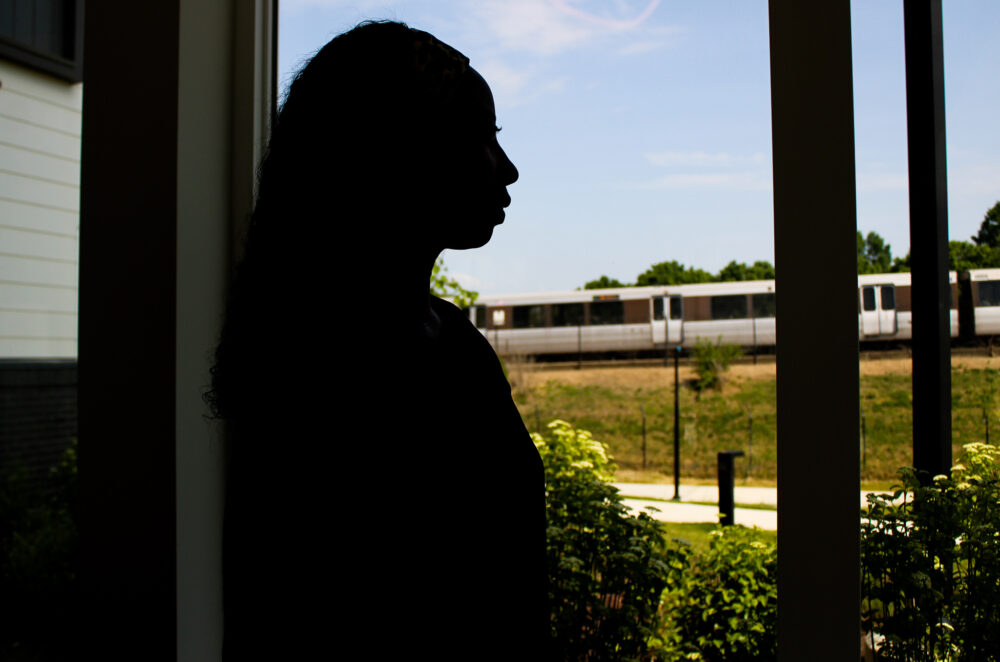HYATTSVILLE, Md. — The sight of amputated limbs, deserted buildings and roads piled up with rubble clung to her.
On LaToya’s 2006 visit to Monrovia, the Liberian civil wars had left the capital a devastated city.
“There was just a lot of destruction,” she said. “It looked like a place that used to be developed, but that was no longer existent.”
LaToya said the trip kindled her love of helping others and her desire to make the world a better place by fighting for peace, inspiring her to pursue a career that supported the missions of international development.
LaToya, 35, whose name Capital News Service has withheld at her request to protect her privacy, joined the United States Institute of Peace seven years ago as a program specialist and senior administrative assistant.
When she first walked into the building, LaToya said she instantly felt the passion and dedication of those working for peace, which gave her hope that a world without conflict was possible.
“I felt that’s where I belonged,” she told Capital News Service in an interview.
Then, on March 28, two weeks after LaToya had been working from home, she received her termination letter and a separation agreement form in her personal email because USIP employees had been locked out of their work emails. It was 10 p.m. She was wrapped in the sheets of her bed, watching a reality TV show.
“Wow, this is really happening,” she thought as she scrolled.
LaToya is among more than 400 institute employees caught up in President Donald Trump’s efforts to dismantle the agency. The move was challenged in the courts, triggering over the last couple of months a roller coaster ride of setbacks and wins for the employees.
LaToya was born to Liberian parents who migrated to the United States in the ’80s because of the civil unrest. LaToya spent her 2006 trip visiting orphanages, whose children had lost parents in the wars. She also volunteered in elementary school classrooms packed with older students who had missed out on learning because of the wars.
A Silver Spring, Maryland, native, LaToya eventually pursued a bachelor’s degree in sociology and international affairs at American University.
She called her work at USIP as being a “global citizen and impacting your neighbor who is next to you, because when one person is doing well, the better we can all do well.”

USIP works in hostile and conflict-prone territories across the globe to de-escalate and resolve conflict through negotiations. The agency also works to prevent violence before it starts to reduce the need for costly military interventions, according to the institute’s former website. The site now says: “Sorry, you have been blocked. You are unable to access usip.org.”
USIP has worked with 87 countries, providing foreign governments and local communities with training, resources, education and policy recommendations and applying best practices to address violence.
The institute has researched religion’s role in conflict, worked to stop violent extremism, improve laws and justice, prevent election-related violence, and support good governance and communities living under authoritarian rule.
USIP was created by Congress in 1984, following proposals from citizens and World War II combat veterans. It received then-President Ronald Reagan’s stamp of approval, and since then has maintained an independent and nonpartisan status. USIP is funded by Congress.
At the USIP’s distinctive, dome-roofed Washington headquarters, LaToya’s workspace was lit by a salt lamp and decorated with green plants and a yarn doll in a colorful tribal dress that her colleague had gifted her.
Most days, and on some weekends, LaToya logged onto her laptop to plan and coordinate conferences that addressed the issues faced by countries in West Africa and the Sahel region, Europe and Central America. Her tasks included organizing speakers, booking flights, creating event schedules, and ensuring that interpreters and the institute’s partner organizations involved in peacebuilding in those countries were paid.
“I was working behind the scenes to keep everything running smoothly,” she said.
In 2022, she traveled to Nigeria to help organize a conference centered on improving community security and rebuilding trust between police officers and civilians.
The conference allowed the groups to talk and listen to each other, she said. As a result, police officers distributed plastic whistles to residents without access to phones or emergency services. The whistles would be used to alert neighbors and law enforcement about criminal activity. LaToya said that, for the first time, people were comfortable enough to speak directly to law enforcement officials.
“It was peace-building in action,” she said. “Oftentimes, that is our role, kind of creating a neutral zone for two parties that may be at odds.”
But LaToya knew the Trump administration would come for her job.
In January, Trump signed an executive order on “Reevaluating and Realigning United States Foreign Aid,” in which he said foreign aid did not align with American interests and then issued a 90-day pause on the distribution of assistance funds to foreign countries.
LaToya explained that some of USIP’s projects were funded by the United States Agency for International Development (USAID), which delivered food, water and medical aid to people globally and which the executive order targeted.
USIP employees whose salaries were tied to USAID-funded projects faced layoffs. While LaToya was having lunch, she saw the workers preparing to leave the building and hugged them goodbye.
Trump signed another executive order in February on “Commencing the Reduction of the Federal Bureaucracy,” which stated that the USIP, along with three other agencies, was an “unnecessary governmental entity,” and that its functions should “be eliminated to the maximum extent” and staff should be reduced “to the minimum presence and function required by law.”
LaToya still went about her daily duties in Washington, but she said she was anxious.
On March 14, LaToya said she and her colleagues received an email that stated all work would be done from their homes. She said Elon Musk’s Department of Government Efficiency (DOGE) had attempted to enter the USIP building, but the institute’s security guards turned them away.
During the same month, the Trump administration fired the institute’s president, George Moose, along with all of the institute’s board members who were presidentially appointed and confirmed by the Senate, according to a lawsuit filed in March by the institute’s former president and board members.
DOGE, the Office of Personnel Management and the General Services Administration successfully entered the USIP headquarters with the help of the FBI and a key provided by the institute’s former security contractor, and transferred the institute’s privately-owned $500 million building to the GSA, according to a litigation filed by USIP employees and the institute’s partners in April.
After receiving her termination letter and separation agreement on March 28, LaToya said she rang up her colleagues, who had also been fired, and vented to them. They had received their termination and separation agreement letters alphabetically. The Trump administration fired the majority of the institute’s staff, with only about two employees left in finance and human resources in the institute’s headquarters, LaToya said.
She had up to 60 days to sign the separation agreement form, and she has not yet done so.
The agreement guaranteed her a payment of about $4,000 and the continuation of health benefits coverage for one month if she would “unconditionally release and forever discharge USIP from any and all claims, liabilities, promises, actions, damages … claims of wrongful discharge that USIP or other releasees have treated you unfairly or in bad faith,” according to the agreement form obtained by CNS. “If you do not sign this agreement, you will not receive the additional payments and benefits.”
“The payments are not an admission of any wrongdoing by USIP,” the form read.
The form also asked LaToya not to disclose the terms within the confidential agreement unless “with the advance written consent of USIP,” or as required by law or requested by governmental agencies.
“It felt like hush money in a way,” LaToya said. “They know the way they’re doing things isn’t the right way to do things. There should be a process to how things are done.”
LaToya could not sleep until 3 a.m. after getting the termination notice. “It wasn’t very restful,” she said, and even when she woke up, she asked herself, “Is this real life?”
She filed for unemployment. She was quiet the following days and began experiencing the stages of grief, she said. “Anger came a little later once I processed everything,” LaToya said.
She found solace in nature and walked through the long trails behind her apartment complex, under the warmth of the sun, as she listened to birds chirping away.
Her husband, with whom she celebrated their one-year wedding anniversary in March, would do the groceries and cook her favorite meals like steak and salmon.
“It meant a lot,” she said.
She went to collect her belongings from the USIP headquarters in early April, and a security guard in a fitted white shirt and navy blue trousers escorted her into the building. She said her goodbyes to colleagues, took pictures with them and parted ways.
On Monday, as LaToya awoke for an adventurous day in Barbados for her cousin’s birthday trip, several messages from her work group chat popped up on her phone.
“We won!” the messages read.
U.S. District Judge Beryl Howell ruled on Monday that the Trump administration’s takeover of USIP was an usurpation of power and the removal of the institute’s president and board members, the termination of staff and the transfer of the institute’s building were “null and void.”
The Justice Department said it plans to appeal the ruling. But the USIP leaders retook possession of their offices on Wednesday.
“We don’t know what happens next,” LaToya said, “but I feel cautiously optimistic.”


You must be logged in to post a comment.